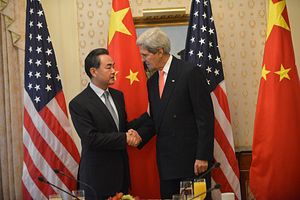At his press conference at the annual meeting of the National People’s Congress (NPC), Chinese Foreign Minister Wang Yi drew a “red line” on the North Korean issue.
“The Korean peninsula is right on China’s doorstep. We have a red line, that is, we will not allow war or instability on the Korean peninsula,” Wang said, according to Reuters.
The Reuters report suggested that Wang’s red line was aimed at North Korea. “China is North Korea’s most important diplomatic and economic supporter,” Reuters noted, before saying “though Beijing’s patience with Pyongyang has been severely tested following three nuclear tests and numerous bouts of saber rattling, including missile launches.”
Reuters also noted that Wang had said that denuclearization is the only way to bring peace the Korean Peninsula, and pointed out, “U.S. Secretary of State John Kerry visited China last month and said after talks in Beijing that China and the United States were discussing specific ways to press North Korea to give up its nuclear program.”
In fact, Wang’s “red line” was not directed at North Korea at all, but rather was directing his remarks at the United States and possibly South Korea. As Ankit Panda and I discussed on the podcast last week, North Korea and China have been pushing for the resumption of the Six-Party Talks over Pyongyang’s nuclear program.
The U.S. in particular, and South Korea less enthusiastically, have refused to budge from their demand that North Korea must demonstrate it is serious about denuclearization before they will agree to return to the negotiation table.
Which brings us back to Foreign Minister Wang’s comments at the NPC this weekend. According to the The People’s Daily, after drawing the red line Wang said: “Confrontation can only bring tension, and war can only cause disaster. Equal-footed dialogue, consultation, and negotiation is the only right way forward. As the host country, we hope there can be an early resumption of the six-party talks. Some dialogue is better than none, and better early than later.”
Elsewhere it quoted Wang as saying: “First, we need climb the slope of denuclearization. Only with denuclearization can the Korean Peninsula have genuine and lasting peace. No matter how long or steep the slope is, we must work persistently without any stop.”
He went on to say that the main stumbling block on this slope of denuclearization was the persistent mistrust between the U.S. and North Korea. Wang then explained that “sustained tensions on the peninsula and several disruptions to the six-party talks” are attributable to this lack of mistrust. Finally, he argued that the only way to overcome this stumbling block of mistrust was through sustained dialogue.
To recap, then, Foreign Minister Wang said that China views war or instability on the Korean Peninsula as a “red line” for China. He then attributed the sustained instability on the Korean Peninsula to the lack of trust between the U.S. and North Korea. Wang then said that the only way the parties could overcome this mistrust—and therefore bring stability back to the Korean Peninsula—was through sustained dialogue. Since it is the U.S. who opposes restarting this dialogue, and North Korea that insists on restarting the talks, Wang was drawing a red line against Washington, not Pyongyang.
The U.S. and South Korea would be wise to ignore China, and continue to insist that North Korea demonstrate its seriousness on the nuclear issue before they return to the Six-Party Talks. If China’s ultimate goal really is denuclearization, it should know that talks without preconditions will not achieve that outcome.
































